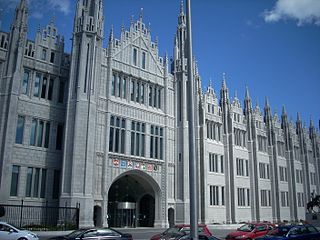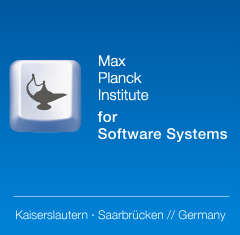
The School of Informatics is an academic unit of the University of Edinburgh, in Scotland, responsible for research, teaching, outreach and commercialisation in informatics. It was created in 1998 from the former Department of Artificial Intelligence, the Centre for Cognitive Science and the Department of Computer Science, along with the Artificial Intelligence Applications Institute (AIAI) and the Human Communication Research Centre.

Abertay University, is one of two public universities in the city of Dundee, Scotland. In 1872, Sir David Baxter, 1st Baronet of Kilmaron, left a bequest for the establishment of a mechanics' institute in Dundee and the Dundee Institute of Technology was formed in 1888. As early as 1902 it was recognised by the Scottish Education Department as an educational hub, and was one of the first to be designated a central institution, akin to an "industrial university". Abertay gained University status in 1994.

The Courant Institute of Mathematical Sciences is the mathematics research school of New York University (NYU), and is among the most prestigious mathematics schools and mathematical sciences research centers in the world. Founded in 1935, it is named after Richard Courant, one of the founders of the Courant Institute and also a mathematics professor at New York University from 1936 to 1972, and serves as a center for research and advanced training in computer science and mathematics. It is located on Gould Plaza next to the Stern School of Business and the economics department of the College of Arts and Science.

The Department of Computer Science is one of nine departments in the University of the Philippines Diliman College of Engineering.

There are fifteen universities in Scotland and three other institutions of higher education that have the authority to award academic degrees.

Alan Richard Bundy is a professor at the School of Informatics at the University of Edinburgh, known for his contributions to automated reasoning, especially to proof planning, the use of meta-level reasoning to guide proof search.

The Max Planck Institute for Software Systems (MPI-SWS) is a computer science research institute co-located in Saarbrücken and Kaiserslautern, Germany. The institute is chartered to conduct basic research in all areas related to the design, analysis, modeling, implementation and evaluation of complex software systems. Particular areas of interest include programming systems, distributed and networked systems, embedded and autonomous systems, as well as crosscutting aspects like formal modeling and analysis of software systems, security, dependability and software engineering. It joins over 80 other institutes run by the Max-Planck-Gesellschaft, which conduct world-class basic research in medicine, biology, chemistry, physics, technology and the humanities.

The Donald Bren School of Information and Computer Sciences, also known colloquially as UCI's School of ICS or simply the Bren School, is an academic unit of University of California, Irvine (UCI), and the only dedicated school of computer science in the University of California system. Consisting of nearly three thousand students, faculty, and staff, the school maintains three buildings in the South-East section of UCI's undergraduate campus, and maintains student body and research affiliations throughout UCI.

The College of Computing at the Georgia Institute of Technology has roots stretching back to an Information Science degree established in 1964. In 1988, Georgia Tech president John Patrick Crecine elevated the School of Information and Computer Science to become the College of Computing, making Georgia Tech the second university to do so, after Carnegie Mellon University created their School of Computer Science.

William Byars Samson is a Scottish astronomer, academic, computer scientist and a researcher in the fields of Astronomy, Databases, Artificial Intelligence, and Artificial Life.

The Information School at the University of Washington is an undergraduate and graduate school that offers BS, MLIS, MSIM, and Ph.D. degrees. Formerly the Graduate School of Library and Information Sciences (GSLIS), the Information School changed its focus and name in the late 1990s.

Jane Elizabeth Hillston is British professor of Quantitative Modelling and Head of School in the School of Informatics, University of Edinburgh, Scotland.
Informatics is the study of computational systems, especially those for data storage and retrieval. According to ACM Europe andInformatics Europe, informatics is synonymous with computer science and computing as a profession, in which the central notion is transformation of information. In other countries, the term "informatics" is used with a different meaning in the context of library science.

Informatics Europe is the European association of university departments and research laboratories, in the field of informatics.
The Luddy School of Informatics, Computing, and Engineering is an academic unit of Indiana University located on the Indiana University Bloomington (IUB) campus and, under the name Indiana University School of Informatics and Computing (SOIC), on the Indiana University – Purdue University Indianapolis (IUPUI) campus. On the Bloomington campus, the School consists of the Department of Informatics, the Department of Computer Science, the Department of Information and Library Science, and the Department of Intelligent Systems Engineering. On the Indianapolis campus, the School consist of the Department of Human-Centered Computing, the Department of BioHealth Informatics, and the Department of Library and Information Science.
The Illinois State University College of Applied Science and Technology strives to produce individuals with skills in critical thinking. The college offers seven different departments including agriculture, criminal justice, family and consumer sciences, health sciences, information technology, kinesiology and recreation, military science, and technology.

Sethuraman Panchanathan is an Indian-American computer scientist and academic administrator, and the 15th Director of National Science Foundation since June 2020. He previously served as the Executive Vice President, ASU Knowledge Enterprise Development and Chief Research and Innovation Officer at Arizona State University (ASU). He was also Director of the Center for Cognitive Ubiquitous Computing (CUbiC), Foundation Chair of Computing and Informatics at ASU and Professor in the School of Computing, Informatics, and Decision Systems Engineering (CIDSE), part of the Ira A. Fulton Schools of Engineering.

Liz Bacon is a professor of computer science and deputy vice-chancellor (academic) at Abertay University, Scotland She is also the current president of EQANIE, the European Quality Assurance Network for Information Education
Dr. Bhavani Thuraisingham is the Louis A. Beecherl, Jr. Distinguished Professor of computer science and the Executive Director of the Cyber Security Research and Education Institute at the University of Texas at Dallas. She is a Visiting Senior Research Fellow in the Department of Informatics at Kings College University of London and a 2017-2018 Cyber Security Policy Fellow at New America.

Hazel Jane Read Hall is a British Information scientist and academic. She is Professor of Social Informatics in the School of Computing at Edinburgh Napier University, Scotland and Docent in Information Studies in the School of Business and Economics at Åbo Akademi University, Finland.














